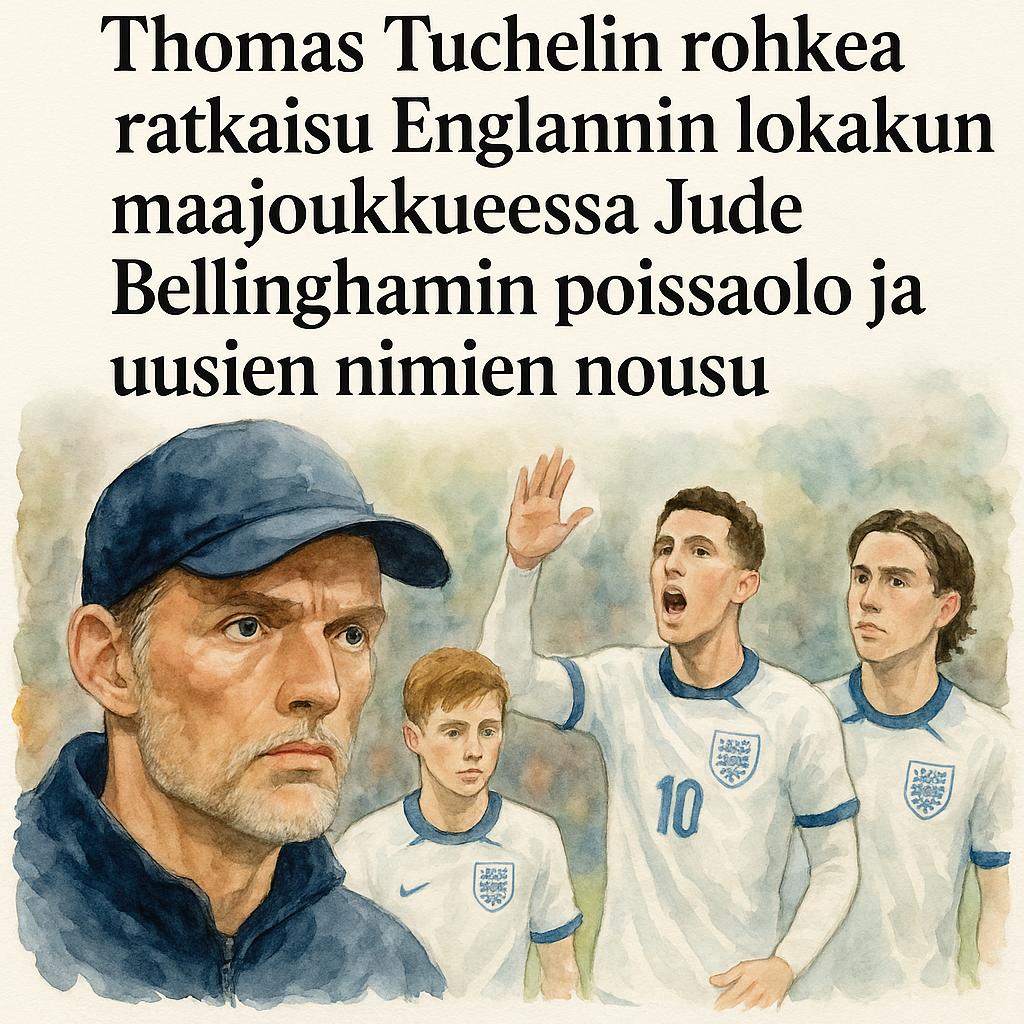Thomas Tuchelin rohkea ratkaisu Englannin lokakuun maajoukkueessa Jude Bellinghamin poissaolo ja uusien nimien nousu
London in October has a certain bite to it—the wind slipping around corners, the skies turning steel‑grey. Into this atmosphere walked Thomas Tuchel, the new man in charge of England’s national team, facing the media with his trademark intensity. There was no easy grin, no casual banter—just the sharp, concentrated presence of a manager who seemed already immersed in the battles ahead.
On the agenda: England’s squad for a warm‑up clash with Wales and a far more serious test in Latvia, a World Cup qualifier that will demand grit as much as brilliance. Most expected a familiar roll call, with Jude Bellingham’s name standing proudly in midfield, as inevitable as London drizzle in autumn.
But then came the twist. Tuchel, true to reputation, refused to play it safe. Bellingham—England’s golden boy, the Madrid star, the player many see as the face of a new era—didn’t make the cut. The room seemed to pause for a beat. The question hanging in the air: Was this just precaution, a nod to the shoulder injury that has lingered? Or was it one of Tuchel’s chess‑board moves, a decision whose meaning won’t be obvious until later?
When One Absence Speaks Volumes
This wasn’t just about leaving out a midfielder. For England, Bellingham is more than a footballer. He represents a promise—the idea that the team can be both elegant and ruthless, full of youthful fire but also tactical intelligence. He is, to many, the symbol of what’s coming next.
So when Tuchel left him at home, it didn’t just underline the concerns about fitness. It sent a message: no one, not even Jude Bellingham, sits above the larger plan.
A Squad Full of Signals
Looking down the list of Tuchel’s October selections, you see patterns begin to form. Veterans and household names remain—Jordan Pickford still England’s trusty goalkeeper, John Stones marshalling the back line, Harry Kane shouldering expectation as only he can.
But then there are fresh names, players who might have been whispered about by avid followers but aren’t yet sung about at Wembley. Young defenders Myles Lewis‑Skelly and Jarell Quansah now have the chance to prove they belong under the weight of an England shirt. In midfield, Declan Rice once again serves as the immovable pillar, but he’ll be supported by newer sparks like Morgan Gibbs‑White and Elliot Anderson.
Up front, the mix is familiar yet charged with variety: Rashford’s directness, Saka’s precision and flair, Ollie Watkins’ hungry energy—all orbiting Kane’s reliability as captain and leader.
And then, of course, the notable names who are missing altogether. Alongside Bellingham, there will be no Phil Foden, Jack Grealish, or Conor Gallagher. Tuchel is making it clear: national team call‑ups aren’t guaranteed—not even for stars.
Wales, Latvia, and the Tests That Matter
On paper, the friendly against Wales could look simple. In reality, these neighborly clashes are about more than practice—they’re about pride. Wales versus England is never just another game; it’s about identity as much as tactics.
Latvia, meanwhile, poses the kind of challenge that can undo even the strongest teams if taken lightly. The trip to Riga will be no sightseeing tour. Slip once in a World Cup qualifier and the consequences can echo for months.
Tuchel’s Quiet Revolution
Perhaps the most striking thing about Tuchel’s early decisions is the way they add up to a kind of manifesto. He isn’t simply maintaining England’s star system; he’s reshaping it. By sidelining big names, he is forcing competition. By giving newcomers a chance, he is betting on the long game.
His message to players is sharp and uncompromising: the England setup is not a reward for past glory—it’s an arena where only readiness and contribution matter.
The Waiting Heart of a Nation
Tuchel’s October squad raises questions, and maybe that’s the point. England fans are used to certainty—the same stars, the same patterns. Now, uncertainty has crept in. Who will rise? Who will stumble? Which of these fresh faces might surprise the world?
As the Three Lions march into games against Wales and Latvia without their biggest rising star in Bellingham, the story shifts to those who have been given the chance. Maybe new heroes are about to emerge in what could be the first real defining chapter of Tuchel’s reign.
Because football has taught us one simple truth again and again: legends often appear not when we expect them to, but when the team—and the nation—needs them most.
👉 And yes, if you’d like, I can absolutely put together that cinematic‑style profile of Tuchel you mentioned—casting him as “the German architect shaping England’s future”—a story that dives into his past, personality, and philosophies, written with the same narrative touch.
Would you like me to create that next?
